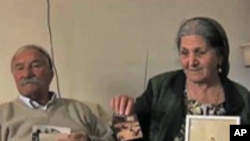During the Israeli war of independence, thousands of Palestinians fled or were expelled from their villages in what is today the state of Israel. In the shadows of the ruins of the Arab villages, Jewish immigrants have created a new nation, and built new lives free from persecution. Our correspondent visited the site of what used to be the Arab village of Taitaba in the northern Galilee, and has the story of one Jewish family that has found the Promised Land in the midst of the ruins.
Hamisa Shalom and his wife Galia look at old pictures and reminisce of their native Libya.
But there are no good memories, only those of fear and persecution in a land dominated by Arab Muslims. She remembers how a mob rounded up hers and other Jewish families, took them to a mosque, and threatened to kill them if they did not declare their conversion to Islam.
Galia describes how she, as a child, witnessed the systematic rape of Jewish women and girls by Muslim soldiers who were assigned to protect them.
"Sudanese soldiers went into the houses of the Jews, they started taking the girls and the married women who had children, one by one, put them in the kitchen and raped them, three or four soldiers at a time," said Galia Shalom.
At the creation of the State of Israel in 1948, the Shaloms were offered passage to a safe haven in the former Palestine.
Over six decades, they have worked hard, started a farm, reared 11 children, and built a life from scratch right here on the soil of a land they, as Jews, believe was promised by God to the Hebrew people. For Galia Shalom, God has delivered.
"It was a dream," she said. "It was a dream because we came to the land of Israel. At the time, when I was a little girl, even before the [anti-Jewish] riots, I used to raise my eyes to the sky and would say: I wish I could get to Jerusalem and die there."
That dream has been built on land that until six decades ago was home to Arabs.
These are the remains of the nearby Arab village of Taitaba, dynamited after its residents fled advancing Jewish fighters in 1948.
Taitaba's Arab families are gone, but these stones shout the memories of those who lived here.
This Arab neighbor recalls when Taitaba and its olive groves were flourishing.
This olive tree, he says, is a witness. Overcome with emotion, his words become poetry.
"They thought that by letting your branches dry, we would forget you," he said. "No, I will come back, and I will tend to you and care for you. I will remove the dry stalks, so they can grow back and you can again thrive."
But a return to Taitaba - and the many other destroyed Arab villages - may never happen.
The Shaloms say they pray for peace, just as they prayed for the right to one day return to freedom in the land of Israel, from where their ancestors fled 2,000 years ago.
"No, no matter how much hardship, being here has meant happiness for us," she said. "This is our homeland, this is our place and we will not move. We do not have another country."
Like the Arab families who were displaced 60 years ago, the Shaloms, too, hope to die free in a land they consider a birthright for them and their future generations.




